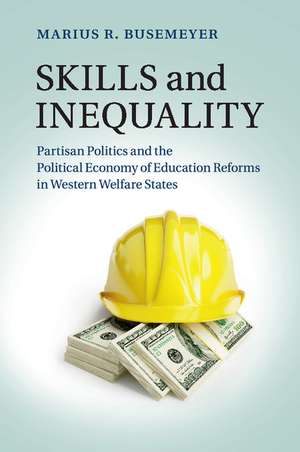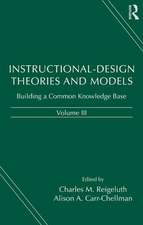Skills and Inequality: Partisan Politics and the Political Economy of Education Reforms in Western Welfare States
Autor Marius R. Busemeyeren Limba Engleză Paperback – 27 apr 2016
| Toate formatele și edițiile | Preț | Express |
|---|---|---|
| Paperback (1) | 282.28 lei 6-8 săpt. | |
| Cambridge University Press – 27 apr 2016 | 282.28 lei 6-8 săpt. | |
| Hardback (1) | 777.81 lei 6-8 săpt. | |
| Cambridge University Press – 3 sep 2014 | 777.81 lei 6-8 săpt. |
Preț: 282.28 lei
Nou
Puncte Express: 423
Preț estimativ în valută:
54.05€ • 56.28$ • 44.84£
54.05€ • 56.28$ • 44.84£
Carte tipărită la comandă
Livrare economică 14-28 februarie
Preluare comenzi: 021 569.72.76
Specificații
ISBN-13: 9781107647930
ISBN-10: 1107647932
Pagini: 326
Ilustrații: 24 b/w illus. 25 tables
Dimensiuni: 152 x 229 x 17 mm
Greutate: 0.44 kg
Editura: Cambridge University Press
Colecția Cambridge University Press
Locul publicării:New York, United States
ISBN-10: 1107647932
Pagini: 326
Ilustrații: 24 b/w illus. 25 tables
Dimensiuni: 152 x 229 x 17 mm
Greutate: 0.44 kg
Editura: Cambridge University Press
Colecția Cambridge University Press
Locul publicării:New York, United States
Cuprins
Introduction; Part I. The Political and Institutional Determinants of Education Policy: 1. Theoretical framework: partisan politics in context; 2. The politics of education and training reform: case studies; 3. Worlds of skill formation: cross-national quantitative analysis; Part II. The Impact of Educational Institutions on Outcomes and Popular Attitudes: 4. Educational institutions and socioeconomic inequality; 5. The impact of educational institutions on popular attitudes and preferences; 6. Conclusion.
Recenzii
'In this path-breaking book, Busemeyer argues that educational policy should be seen as an integral part of the welfare state, with major consequences for our understanding of inequality. Using an impressive combination of macro-historical and micro-statistical evidence, Busemeyer shows how partisan governments led countries down distinct institutional paths, and how these paths now shape distributive outcomes. This is a book about education, but it is also a book about the perhaps most pressing issue of our time: rising inequality.' Torben Iversen, Harvard University
'Skills and Inequality reveals how seemingly technical choices in education policy have crucial reverberations for the design of welfare states, managed capitalism, class conflict, public regard for government and inequality. In an echo of Gosta Esping-Andersen's game-changing formulation of three worlds of welfare capitalism, Marius Busemeyer vividly illuminates the profound impacts of three worlds of education institutions: general education, school-based vocational training, and dual apprenticeship systems. This original and important book opens our minds to a central but understudied aspect of the welfare state and, just as Esping-Andersen did a generation before, is destined to alter the field of comparative political economy.' Cathie Jo Martin, former Chair of the Council for European Studies
'This book is invaluable as it aims at reconciling comparative welfare state with scholarly work on education and training systems. The combination of masterly theoretical reflection, rigorous statistical analysis and case study research is social science at its best and a must-have for every bookshelf.' Herbert Obinger, The Center for Social Policy, University of Bremen
'This is a remarkable book on a very important topic. Busemeyer's Skills and Inequality elegantly integrates analyses of welfare capitalism and educational systems into an argument that helps us better understand the politics of inequality. Combining qualitative and quantitative methods, this book represents a significant contribution to the literature on the comparative political economy of industrialised democracies. Busemeyer's careful research is a must-read for those who care about the determinants of inequality.' David Rueda, Oxford University
'Skills and Inequality reveals how seemingly technical choices in education policy have crucial reverberations for the design of welfare states, managed capitalism, class conflict, public regard for government and inequality. In an echo of Gosta Esping-Andersen's game-changing formulation of three worlds of welfare capitalism, Marius Busemeyer vividly illuminates the profound impacts of three worlds of education institutions: general education, school-based vocational training, and dual apprenticeship systems. This original and important book opens our minds to a central but understudied aspect of the welfare state and, just as Esping-Andersen did a generation before, is destined to alter the field of comparative political economy.' Cathie Jo Martin, former Chair of the Council for European Studies
'This book is invaluable as it aims at reconciling comparative welfare state with scholarly work on education and training systems. The combination of masterly theoretical reflection, rigorous statistical analysis and case study research is social science at its best and a must-have for every bookshelf.' Herbert Obinger, The Center for Social Policy, University of Bremen
'This is a remarkable book on a very important topic. Busemeyer's Skills and Inequality elegantly integrates analyses of welfare capitalism and educational systems into an argument that helps us better understand the politics of inequality. Combining qualitative and quantitative methods, this book represents a significant contribution to the literature on the comparative political economy of industrialised democracies. Busemeyer's careful research is a must-read for those who care about the determinants of inequality.' David Rueda, Oxford University
Notă biografică
Descriere
This book argues that critical choices about the institutional design of education systems in the post-war period have long-term implications for social inequality.













